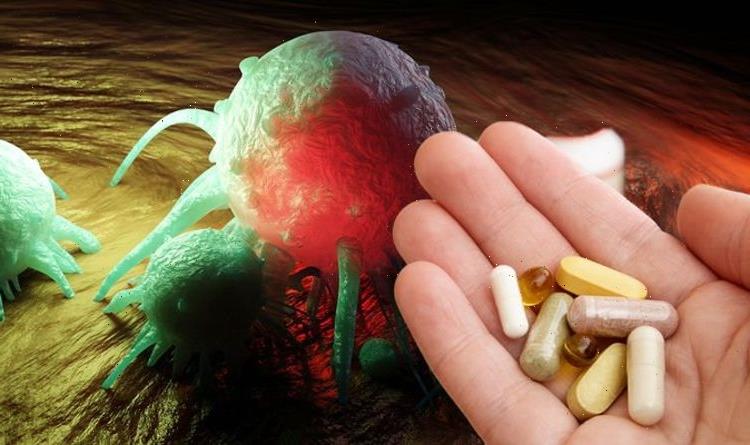Cancer symptoms: Top 14 early signs to look out for
We use your sign-up to provide content in ways you’ve consented to and to improve our understanding of you. This may include adverts from us and 3rd parties based on our understanding. You can unsubscribe at any time. More info
What you put into your body can determine your risk of developing cancer. Experts believe healthier diets could prevent around one in 20 cancers. However, it is fiendishly hard to assess the impact of specific items because many factors may influence outcomes. Notwithstanding the limitations, vitamin E supplementation has raised alarm bells.
Vitamin E (also known as alpha-tocopherol) is a fat-soluble vitamin found in foods such as eggs, nuts, green leafy vegetables, wholegrains, and plant oils.
It is a natural antioxidant, which means it has a protective effect on our cells.
“Many claims have been made about vitamin E’s potential to prevent and treat disease through its antioxidant function and roles in anti-inflammatory processes, but data on whether supplementation can reduce cancer risk are mixed,” explained Jo Cunningham, registered dietitian specialising in oncology at Perci health.
According to Ms Cunningham, several studies have examined whether vitamin E supplementation affects the risk of developing cancer.

While some results found no association between supplementation and cancer risk, the SELECT trial found a “statistically significant” increase in risk for prostate cancer compared to men only taking placebos, she reported.
A closer look at the trial
SELECT stands for the Selenium and Vitamin E Cancer Prevention Trial. It’s a clinical trial to see if one or both of these substances could help prevent prostate cancer when taken as dietary supplements.
The trial was initially planned for a minimum of seven years and a maximum of 12 years of participants taking supplements, plus follow-up observation after the men finished taking their supplements.
However, the independent Data and Safety Monitoring Committee (DSMC) for the trial met on September 15, 2008, to review SELECT study data and found that selenium and vitamin E, taken alone or together, did not prevent prostate cancer.
DON’T MISS
Cancer: The hot drink ‘strongly’ associated with cancer [INSIGHT]
Visceral fat: Lipid-lowering food that reduces belly fat [TIPS]
High cholesterol: Three signs on your toes [ADVICE]
What’s more, although there were no statistically significant differences in the rates of prostate cancer between the four groups in the trial, there were more cases of prostate cancer in men taking only vitamin E.
Statistical significance describes a mathematical measure of how sure one can be that a difference seen is not due to chance.
Additional data from the trial in 20111 showed that the men who took vitamin E alone had a 17 percent relative increase in numbers of prostate cancers compared to men on placebo.
This difference in prostate cancer incidence between the vitamin E only group and the placebos only group was regarded statistically significant, and not likely to be due to chance.

“The current consensus is that evidence to date is insufficient to support taking vitamin E to prevent cancer, and large doses may increase the risk of prostate cancer,” warned Ms Cunningham.
She continued: “Note that for those on cancer treatment, it isn’t recommended to have any high-dose antioxidant supplements (such as vitamins A, C and E), as the evidence is inconclusive as to whether antioxidants can be too protective to the cancer cells that the chemotherapy or radiation therapy is trying to target.”
According to Ms Cunningham, antioxidants from food do not have the same effect and are beneficial to include in the diet.
What does the expert recommend?
“Ditch the supplements (which means you don’t have to worry about taking too much) and aim to meet your nutritional needs through a wide range of foods.”

As Ms Cunningham pointed out, not only will you likely be getting enough vitamin E, you’ll also be getting other plant-based benefits including a range of other nutrients as well as the all-important fibre.
“Fibre feeds the trillions of gut microbes living in the large intestine, which amongst other beneficial functions, produce beneficial and anti-inflammatory compounds, as well as support the immune system.”
Prostate cancer – main symptoms to spot
According to the NHS, Prostate cancer does not usually cause any symptoms until the cancer has grown large enough to put pressure on the tube that carries urine from the bladder out of the penis (urethra).
Symptoms of prostate cancer can include:
- Needing to pee more frequently, often during the night
- Needing to rush to the toilet
- Difficulty in starting to pee (hesitancy)
- Straining or taking a long time while peeing
- Weak flow
- Feeling that your bladder has not emptied fully
- Blood in urine or blood in semen.
Source: Read Full Article
